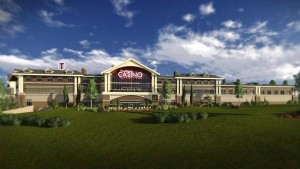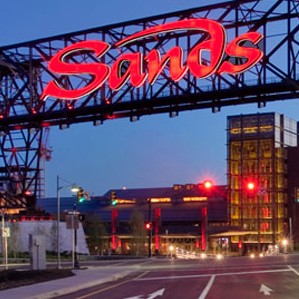“The economy is so depressed around here, anything is a plus. That’s how bad it is around here.” With that backhanded endorsement, the owner of Pepe’s Bar-B-Q in Binghamton, N.Y., gave his blessing to casinos in the area. In order to make their case  to the casino-siting board, Binghamton city fathers have had to accentuate the negative, pointing to their cities’ high poverty rate (31%) and leading status in depression, obesity and pessimism. The Binghamton area appears likely to get at least one casino — but where? Tioga Downs already has VLTs, so upgrading it to a full-service casino might seem redundant. Traditions at the Glen (above) at least has the resort atmosphere that New York State seems to want in its casinos. Those are just two of the projects jostling for advantage in the casino-selection process.
to the casino-siting board, Binghamton city fathers have had to accentuate the negative, pointing to their cities’ high poverty rate (31%) and leading status in depression, obesity and pessimism. The Binghamton area appears likely to get at least one casino — but where? Tioga Downs already has VLTs, so upgrading it to a full-service casino might seem redundant. Traditions at the Glen (above) at least has the resort atmosphere that New York State seems to want in its casinos. Those are just two of the projects jostling for advantage in the casino-selection process.
Virtually all of the casino proposals are near the ivy-clad groves of academe, a turn of events upon which some frown. “We do not need a casino within a short drive to distract and attract our … college students who, all over this country, are already burdened with monumental student debt,” harrumphed one professor, Traditions, for instance, would be three miles from Binghamton University and six from Broome Community College. This means a tranche of 21-and-over players and potential employees to draw upon. (The runaway success of a new Dave & Buster’s is cited as precedent.) Broome College is already offering a casino-management learning track.
Rush Street Gaming has vowed it wouldn’t market to college students in the Schenectady area, in keeping with company policy. By contrast, Hard Rock International‘s Albany proposal would be aggressively positioned for millennials for its concerts and other amenities. Given the state’s sensitivity to underage gambling, that may not be the message Albany wants to hear.
* Once kicked to the curb by its parent company, Sands Bethlehem is now a point of pride. It has the biggest workforce of any casino in Pennsylvania, routinely leads in table game revenue and comps ($143 million). It’s raking in over $1 million a day. Its  amenities are music to the ears of the Pennsylvania Gaming Control Board, which calls Sands Bethlehem “what the board intended when it was deciding who should get the limited number of licenses.” Only Parx Casino, in the greater Philadelphia area, gives Sheldon Adelson‘s property a run for its money and even Parx can’t come close to Sands’ $177 million a year haul at the tables, fed by 50 busloads a day of New York City gamblers. Even the opening of Resorts World New York has failed to dent Sands’ firmly entrenched position. Adelson, who once characterized the investment as a mistake now says, “Our property in Bethlehem is probably one of the most profitable … casinos of all the hundreds of casinos in local markets. It’s probably one of the most profitable, if not the most profitable.” Gaming revenue in Pennsylvania slipped 3% in 2013, but Sands Bethlehem can afford a little attrition better than its competitors.
amenities are music to the ears of the Pennsylvania Gaming Control Board, which calls Sands Bethlehem “what the board intended when it was deciding who should get the limited number of licenses.” Only Parx Casino, in the greater Philadelphia area, gives Sheldon Adelson‘s property a run for its money and even Parx can’t come close to Sands’ $177 million a year haul at the tables, fed by 50 busloads a day of New York City gamblers. Even the opening of Resorts World New York has failed to dent Sands’ firmly entrenched position. Adelson, who once characterized the investment as a mistake now says, “Our property in Bethlehem is probably one of the most profitable … casinos of all the hundreds of casinos in local markets. It’s probably one of the most profitable, if not the most profitable.” Gaming revenue in Pennsylvania slipped 3% in 2013, but Sands Bethlehem can afford a little attrition better than its competitors.
* Hell is being a juror on the year-long Harmon Hotel construction-defects trial.
* Illinois casinos had the opportunity to block slot routes in the Land of Lincoln and they blew it. So now they’re losing business to an 18,000-machine industry that is estimated to be producing $180 million in taxes. There’s no going back from numbers like those. Small businesses in small towns are reporting their success stories and the extra video-game revenue is obviously making a positive difference for them.
“I think it’s been a blessing for most everybody,” says Michael Gelatka, president of the Illinois Gaming Machine Operators Association. He’d get an argument from Illinois Casino Gaming Association Executive Director Tom Swoik, who laments, “I think there is a lot of cannibalization.” But how could Swoik have failed to anticipate this development? A baby could have seen it coming.

